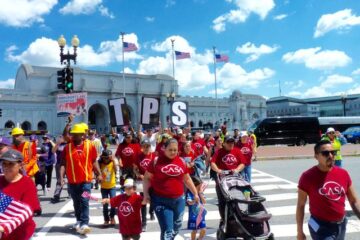
Just two years after former general Otto Perez Molina resigned the presidency and he and his vice president were sent to jail on corruption charges, the current president, comedian Jimmy Morales, faces impeachment for corrupt campaign financing.
Though Morales attempted yesterday to expel Ivan Velasquez, the director of the International Commission Against Impunity, CICIG, the Constitutional Court quickly blocked the order.
After the highest court ruling if the Executive were to attempt to expel Velasquez it would amount to a coup. Given that press reports indicate the Vice President may be implicated in the same crimes, who will be president a few weeks from now is anyone’s guess.
See GHRC’s summary below; don’t miss the outline of what comes next in the last paragraph. The Guardian’s description of the crisis is helpful. Congressman Engel and Senator Leahy put out statements in support of CICIG.
Guatemalan President Seeks to Expel CICIG Director from the Country
Protests outside the Guatemalan Presidential Palace began a week ago as rumors circulated that Guatemalan president Jimmy Morales intended to expel the director of the International Commission Against Impunity in Guatemala (CICIG), Colombian national Ivan Velasquez. Tension picked up last Tuesday when the presidential spokesman confirmed that President Morales intended to visit New York to ask the United Nations Secretary General to remove Velasquez. Morales began the fruitless trip to the UN headquarters on Thursday, August 24, first stopping in Miami, and then proceeding to the UN headquarters in New York on Friday morning, though it is still unclear with whom he met.
CICIG requests the impeachment of President Morales and two other party chairs
That very afternoon Attorney General Thelma Aldana and CICIG Director Ivan Velasquez announced the first two impeachment proceedings arising from CICIGs ongoing investigation into the funding of the tumultuous 2015 elections that followed the resignation and imprisonment of the president at the time, Otto Perez Molina, and his Vice President, Roxanne Baldetti; the District of Colombia later requested the extradition of Baldetti and the then Minister of Governance on drug trafficking charges. Thursday’s accusations are against Congressmen Roberto Villate and Orlando Blanco, chairs of the Lider and UNE parties during the 2015 campaign. Lider and UNE had unsuccessfully challenged Jimmy Morales’ FCN party for the presidency. Both are accused of receiving unregistered donations.
The next day, Friday afternoon, Aldana and Velasquez announced they seek the impeachment of President Jimmy Morales, who had served as chair of the FCN party during the 2015 campaign, on charges of not reporting over $800,000 in donations. In May 2016 former military officer Marlon Monroy Meoño, was arrested on drug trafficking charges, and extradited to Florida in November 2016. Guatemalan newspapers reported he had admitted to giving $400,000 in unregistered cash donations to Morales’ campaign, some reports claim payments were received by Vice President Jafeth Cabrera’s son, and that Cabrera is currently living in a house purchased with cash donations. President Morales’ son and brother have been in prison since January on charges of receiving payments from a government land registry for over $12,000 in false food and entertainment receipts.
CICIG director declared Non-Grata
At 6am on Sunday morning President Morales announced he was expelling Ivan Velasquez from Guatemala. Three constitutional challenges were immediately presented, including one from the government Human Rights Procurators office, and by 11:30am the Constitutional Court ruled the president’s order unconstitutional in a 3 to 2 decision.
Protesters waved Guatemalan flags, danced and chanted “Jimmy goes, Ivan stays.” Even the threats of violence popping up in social media didn’t dampen spirits; “The Constitution Court is responsible for the violence to come.” Threats centered on the magistrates, though rumors circulated that the FCN planned to send violent counter protesters.
What comes next?
Today, Monday, August 28 a lower court judge should be assigned and within three days should decide if the impeachment will proceed. The ruling will then go to the Supreme Court, which will also have three days to decide. If the rulings support the impeachment, the court will ask Congress to form a randomly chosen 5-person committee to review the impeachment; congress has a week to convoke the committee and no time limit in which to decide.
Should Morales be impeached, or resign, Vice President Cabrera will take over his job, yet press reporting indicates Cabrera is implicated in the same crimes as Morales; protesters are also calling for Cabrera’s prosecution. Should both the President and Vice President be impeached, Congress will choose the successor.
Source: Guatemala Human Rights Comission (GHRC)



